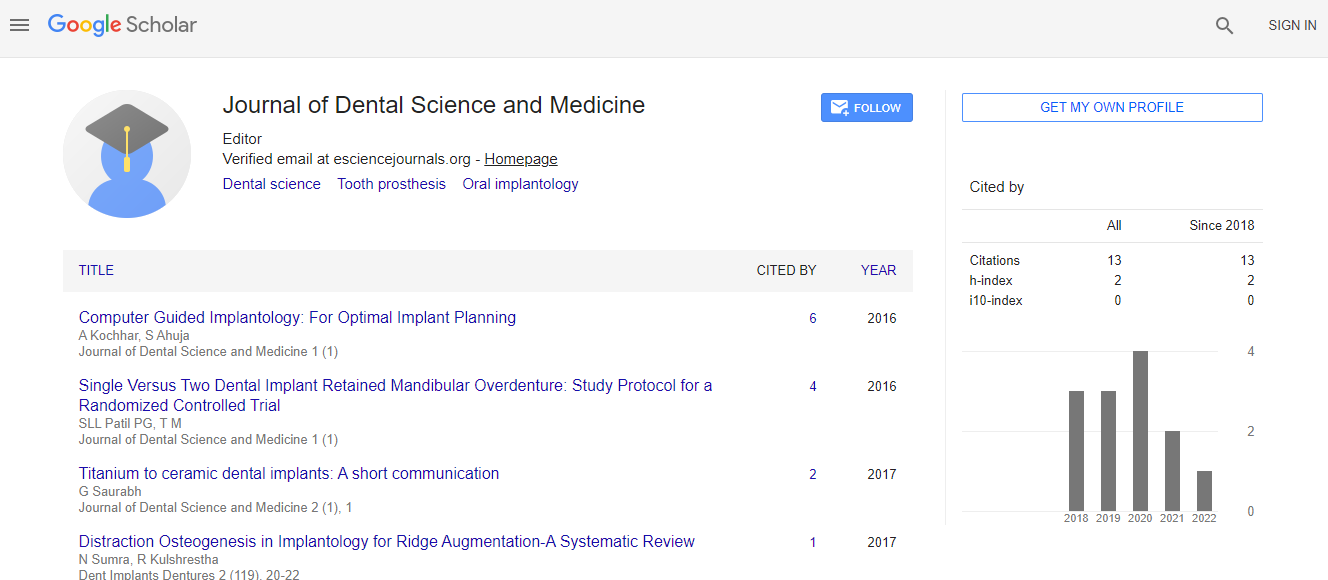Our Group organises 3000+ Global Conferenceseries Events every year across USA, Europe & Asia with support from 1000 more scientific Societies and Publishes 700+ Open Access Journals which contains over 50000 eminent personalities, reputed scientists as editorial board members.
Open Access Journals gaining more Readers and Citations
700 Journals and 15,000,000 Readers Each Journal is getting 25,000+ Readers
Google Scholar citation report
Citations : 13
Journal of Dental Science and Medicine received 13 citations as per Google Scholar report
Indexed In
- RefSeek
- Hamdard University
- EBSCO A-Z
- ICMJE
Useful Links
Recommended Journals
Related Subjects
Share This Page
E-BABE - Fracture resisitance ceramic crowns supported with indirect composite cores
27TH AMERICAN DENTAL CONGRESS
Abdulkhaliq Alshadidi
King Khalid University, KSA
ScientificTracks Abstracts: J Dent Sci Med
Abstract
Aims and Objectives: To evaluate the influence of indirect chair-side polymerization of resin composite cores on the fracture resistance of overlaying IPS e.max press crowns. Materials and Methods: Root canals of 60 extracted premolars were prepared to receive #2 fiber posts after the crowns were sectioned 2 mm above the cervical line. In groups 1–3 (n = 10 each), posts were luted to the prepared dowel spaces using selfadhesive resin cement. Resin composite cores were then bonded and incrementally built-up using Filtek Z250 XT, Filtek P60, and Filtek P90 resin composites. In groups 4–6 (n = 10 each), the fabricated post-core systems were subjected to post-curing heat and pressure treatment before cementation to their respective teeth using self-adhesive resin cement. Another 10 sound premolars served as control. All teeth in the test and control groups were then subjected to standardized preparation to receive IPS e.max press crowns before testing their fracture resistance and the mode of restorations' failure. The collected results were statistically analyzed using ANOVA, Kruskal–Wallis, and Tukey's tests on the past software used at α=0.05 to stand on the significance of the detected differences. Results: Significant differences were detected between the fracture resistance of teeth in different groups (ANOVA, P = 2.857E- 35). Crowns in groups 4–6 provided higher fracture resistance than those in groups 1–3 (Tukey's test, P < 0.05). Crowns in groups 4 and 6 provided higher fracture resistance than the control, while those in groups 2 and 3 provided lower fracture resistance than the control (Tukey's test, P < 0.05). Conclusion: Indirect composite cores improved the fracture resistance of IPS e.max press crowns when compared to directly fabricated post and cores. The directly and indirectly polymerized nanohybrid, methacrylate-based composite (Filtek Z250 XT) cores yielded the highest fracture resistance for the utilized all-ceramic crowns.Biography
Alshadidi has completed his BDS at the age of 25 years from King Khalid University and postgrad studies Saudi Board in Prosthdontic Dentistry in Saudi Commession for Health specialties. He has published more than 2 papers in reputed journals.
E-mail: aalshadidi@kku.edu.sa

 Spanish
Spanish  Chinese
Chinese  Russian
Russian  German
German  French
French  Japanese
Japanese  Portuguese
Portuguese  Hindi
Hindi 